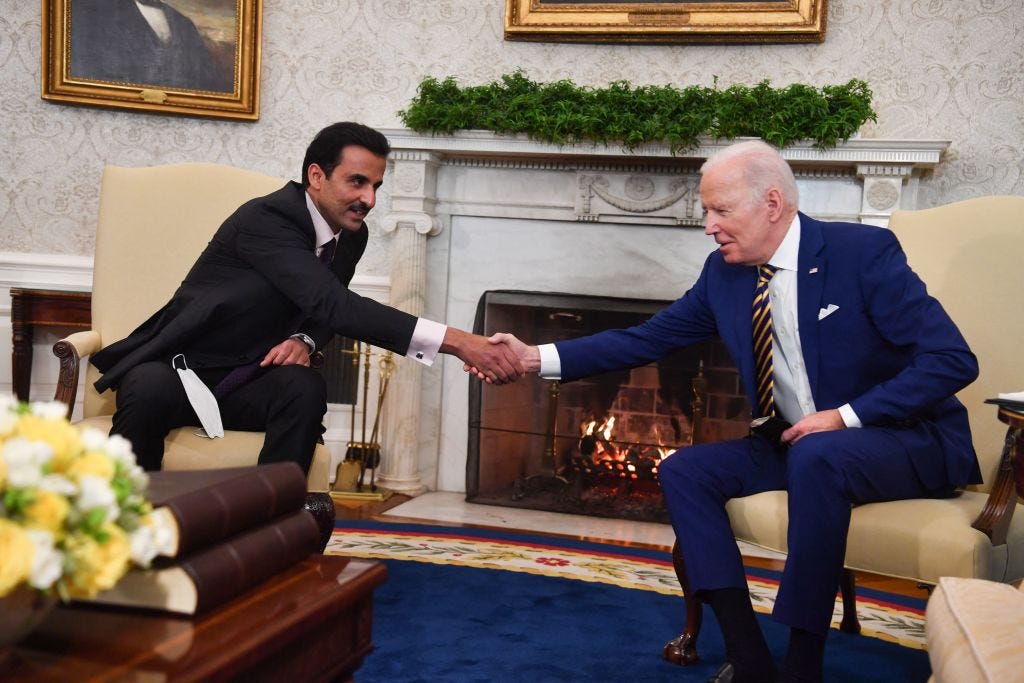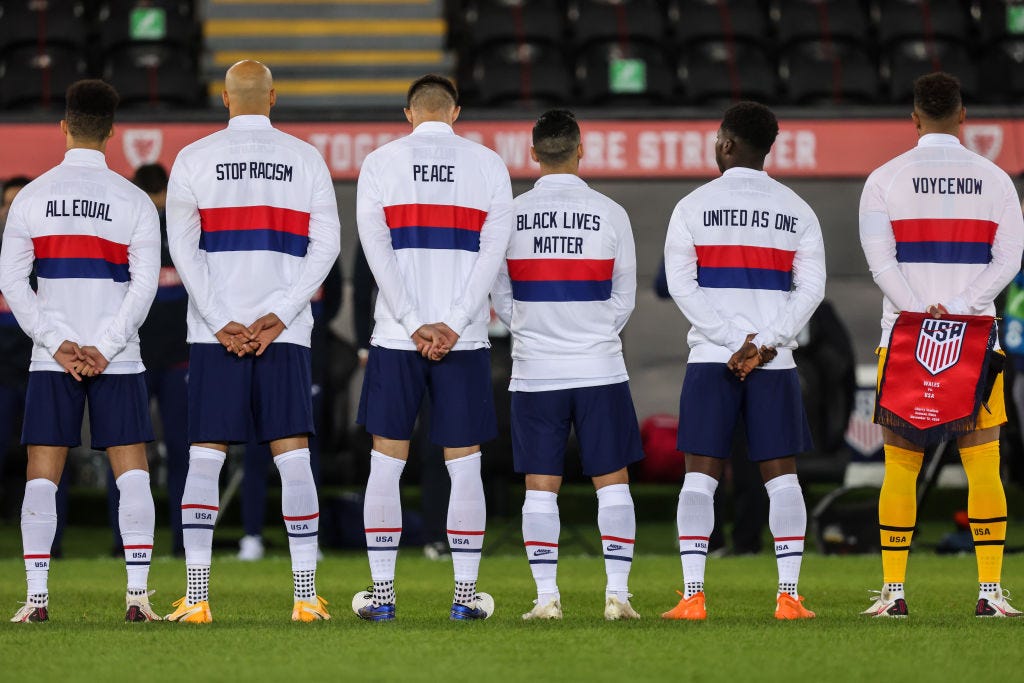Premium: The Qatar Chronicles, Part II
What are the U.S. Soccer Federation and U.S. players doing to address the treatment of migrant workers, LGBTQ rights and women's rights in the World Cup host nation? And is it enough?

To read Part I of The Qatar Chronicles, go here.
DOHA, Qatar — When I walked into the lobby of the U.S. team hotel for the World Cup, it felt like entering the palace owned by the King of the World. The Marsa Malaz Kempinski, a pile of polished marble built on a man-made island called The Pearl, has a 40-foot-high chandelier, a constantly playing concert piano and an automotive guard of honor featuring Maybachs, Maseratis and Ferraris—and that’s just at the entrance.
Of the 14 FIFA hotels I visited during my trip to Doha in February for Part I, the Marsa Malaz was by far the most opulent. A royal suite this January, after the circus leaves town, will still cost you $16,500 per night. It’s the only FIFA hotel in The Pearl, Doha’s toniest location, just down the street from an ersatz Venice complete with canals and Italian boats. The USMNT may not win the World Cup, but when it comes to travel and logistics, U.S. Soccer is undeniably world-class.
Yet even as the crown jewel of Qatar’s FIFA hotels, the Marsa Malaz has been the subject of abuse allegations involving the migrant workers who toil there. Liverpool declined the chance to stay at the hotel during the 2019 FIFA Club World Cup after The Guardian’s Pete Pattisson—the gold standard of investigative reporters in Qatar—revealed the hotel’s violations of Qatari labor law, including paying salaries below the minimum wage and employing workers who’ve paid recruitment fees that can cause crippling debt.

The Marsa Malaz operators promised to address those concerns, and before I traveled to Qatar in February a U.S. Soccer official told me about meetings the federation (citing the Liverpool decision) had initiated with the hotel, which said it held monthly sessions with a council of employees during which complaints were heard. “We don’t want to get into a situation where our hotel isn’t paying workers,” the U.S. Soccer official told me in January, “and we want to make sure workers aren’t paying recruitment fees.”
But literally the first Marsa Malaz worker I spoke to four weeks later, a security guard from an East African country, told me he had paid an illegal recruitment fee of $2,200 to get to Qatar just a few months earlier. He was earning $467 a month working six days a week, eight hours a day—or about $2.25 an hour, slightly above the $1.25/hour minimum wage in the world’s richest country. When I asked him about the hotel’s council of employees that U.S. Soccer had told me about, he said he had never heard of such a thing.
One thing I learned in speaking to nearly two dozen migrant workers in Qatar and to human rights groups is that the abuse of hotel workers there takes place more often inside subcontractor companies that have deals to provide workers for hotels, and not as often with employees the hotels hire directly. The security guard I spoke to at the Marsa Malaz worked for a subcontractor. I came away in February thinking that U.S. Soccer was well-meaning but a bit naive about the real situation on the ground.

But then U.S. Soccer took things to a new level of oversight. In April, the federation started participating in regular joint committee meetings with the Marsa Malaz and its employee council. And in May, U.S. Soccer hired Lisa Saad, a former executive director of the American Chamber of Commerce in Qatar, to serve as a compliance officer on the ground in Doha to ensure that every company and vendor the federation is working with, including its hotel, is following a checklist of worker welfare regulations and labor laws—including for subcontracted employees.
GrantWahl.com is a reader-supported soccer newsletter, and this is how I make my living. Traveling to Qatar to do independent journalism requires resources. The best way to support me and my work is by taking out a paid subscription now. Save money on annual subscriptions from now until November 8 ahead of my World Cup coverage from Qatar.
Sure enough, audits of the Marsa Malaz by Qatar’s Supreme Committee for Delivery and Legacy of the World Cup and an independent British group called Impactt revealed violations by the security guard subcontractor working with the U.S. team hotel—violations I had seen myself in February. As Saad explained to me, “The hotel had subcontracted out with a security company that was found to not be adhering to certain labor laws and regulations. And they red-listed that subcontractor and gave the hotel a time frame to make a switch, or the hotel would be dinged on their main reporting. So I’m following along to make sure they’re still maintaining that.”
“The hotel made the change very quickly,” U.S. Soccer chief communications officer Neil Buethe told me. “They switched their subcontractor to another group that is in compliance. So we felt like these things may arise, but by having this process in place, we are ensuring that we are going to make changes as needed as soon as possible.”
I am naturally skeptical of most things connected to the Qatar Supreme Committee, and it’s true that one worker I interviewed at a different hotel in Qatar later messaged me alleging that the subcontractor he relies on for work and housing locked up him and other workers against their will and prevented them from being interviewed by auditors.
Yet it’s true that the independent audits of the U.S. team hotel done by Impactt—in which more than 200 Marsa Malaz workers have been interviewed and the hotel is scored on “ethical recruitment” and “accommodation” for workers—caused a real change in the case of the security guard subcontractor. A change that U.S. Soccer made sure got pushed through quickly.
“The reporting that the Supreme Committee and Impactt have done has been pretty extensive with the hospitality industry,” said Saad. “So they have red-listed certain hotels. I can tell you from the beginning of the time that they started doing their audits at Marsa Malaz in 2019 to right now, the hotel has improved significantly. They’ve color-coded hotels into red, yellow, and green. Marsa Malaz is ranked in one of the top percentiles of all of the hotels that they’re auditing.”
A system of new labor laws combined with genuine enforcement on the ground and punishment of bad actors is the only way that real progress will happen in the treatment of migrant workers, and as we learned in Part I of The Qatar Chronicles, the enforcement part is still lacking, according to human rights organizations such as Amnesty International. Appointing a compliance officer on the ground in Qatar was a constructive move by U.S. Soccer—and one that has led to the International Labour Organization recommending that other national federations competing in the World Cup do the same.
“Guys want to have a voice, but you want to have a voice understanding the information that you’re putting out there. That’s important to me, to learn about it and make sure I understand it. But not every player has that same picture, so we have to find a collective way to come together and speak about it.” — U.S. midfielder Tyler Adams
But there’s still a lot more work to do overall to protect migrant workers in Qatar. The security guard I interviewed at the Marsa Malaz in February has stayed in touch with me on WhatsApp. He stopped working at the hotel after his subcontractor company was replaced. But he’s still toiling in Qatar, still trying to earn money to repay his recruitment fee and send funds back home. Someday, he tells me, he wants to be a teacher. He says his employer won’t let him change to a different company—another violation of Qatari law.
“How can I get in touch with you to visit USA?” he wrote me recently. “Is it possible to get jobs there?”
Why not boycott Qatar’s World Cup? It’s a question you hear from people who point to a number of potential reasons, including:
• Qatar’s record on migrant workers, who make up 95 percent of the nation’s workforce and 73 percent of its population. Last year, The Guardian’s Pattisson cited government sources to report that more than 6,500 migrant workers had died in Qatar in the decade since the country was awarded the World Cup in 2010. (A total of 39 deaths have been directly tied to World Cup stadium construction, though nearly all of Qatar’s infrastructure growth has some connection to the World Cup.) Qatari officials claim the migrant mortality rate is within the expected range given the workforce size, but experts Amnesty International spoke to were skeptical of that claim because the data on migrant deaths is of such low quality.
Amnesty says Qatar has failed to properly investigate up to 70 percent of its migrant worker deaths, noting that “in a well-resourced health system, it should be possible to identify the exact cause of death in all but 1 percent of cases.” Qatar introduced new laws in 2019 that it said would protect migrant workers and end the kafala system, which required migrants to have sponsors who controlled their exit visas and could thus prevent them from leaving the country. But human rights groups say enforcement on the ground has been lacking.

• LBGTQ rights in Qatar. Same-sex relations are illegal in Qatar, and gay citizens have been detained by security forces, even recently. In 2020, Qatar said LGBTQ visitors would be welcome at the World Cup and fans could fly the rainbow flag at games. But “excessive” public displays of affection could face action from police.
• Women’s rights in Qatar. Restricted by the country’s male guardianship law, Qatari women have to obtain permission from their male guardians to get married, travel abroad until certain ages and receive some forms of reproductive health care. Human rights groups have also raised concerns that women who report sexual violence to the police could face prosecution for having participated in extra-marital sex.
• Allegations of a corrupt World Cup bid process. In 2020, a U.S. Department of Justice indictment found that Qatar had bribed FIFA officials to vote for the country as a World Cup host in 2010. (Qatar denies the allegations.)
Yet a boycott of the Qatar World Cup by participating nations or players has failed to gain any momentum. Why? For starters, there hasn’t been a significant boycott of the World Cup or Olympics in the four decades since the boycotts of the 1980 Moscow Olympics (by the U.S. and Western nations in response to the Soviet Union’s invasion of Afghanistan) and the 1984 Los Angeles Olympics (by the Soviet Union and other Eastern bloc countries, purportedly for “security concerns”).
Nor did U.S. and Western countries institute athlete boycotts of this year’s Beijing Winter Olympics, though there was a diplomatic boycott of those Games by the U.S., Great Britain, Canada and Australia in response to what the U.S. government has called genocide by China against its Uyghur population.
Unlike China, though, Qatar is an ally of the U.S. government, and not just an ordinary one but a major non-NATO ally, as President Biden designated Qatar earlier this year. There’s even a U.S. military base in Qatar, the Al Udeid Air Base west of Doha.

U.S. coach Gregg Berhalter was first asked about the possibility of boycotting the Qatar World Cup on July 17, 2021, at a time when some national teams like Norway and Germany were wearing t-shirts protesting the event.
“There’s protests like Norway, and that’s one way to do it,” Berhalter said. “But I also think that we need to bring awareness to the situation, and I think boycotting the World Cup may not do so much good. But participating and bringing awareness to the situation could potentially do [that]. So our job is to educate the players, educate the staff on exactly what’s going on there and come up with our own message of how we want to make change.”
In reality, U.S. Soccer had already started that process nearly two years before that.
Not long ago, I discussed Qatar with U.S. midfielder Tyler Adams. He may be just 23 years old, and he may not always wear the captain’s armband in Berhalter’s rotation of the position, but Adams is the de facto captain of the USMNT among the players on the team. When he speaks, people listen.
“As players, everyone will say our job is to go there and play football, as it is,” he told me. “But the truth of the matter is we are trying to inform ourselves on as much stuff as possible so we have a complete understanding—for the guys that want to have a complete understanding—of what’s going on in Qatar right now. In Kansas City [in June, U.S. Soccer] sat us down and had a PowerPoint presentation about: This is what’s going on. These are some of the studies that have been done with people visiting hotels and talking about the LGBTQ community. They’re giving us the details that we need and saying: If people want to speak up about it on their platforms, we’re going to support you guys in doing that.
“I think that’s super important with our team,” Adams went on, “especially being such a young team. Guys want to have a voice, but you want to have a voice understanding the information that you’re putting out there. That’s important to me, to learn about it and make sure I understand it. But not every player has that same picture, so we have to find a collective way to come together and speak about it.”
On October 26, the Australian men’s national team became the first team participating in Qatar to come out with a statement about human rights, including remediation for migrant workers who have been harmed and decriminalization of same-sex relationships in Qatar:
What will the U.S. players do collectively? And will it be as powerful as the message from the Australian team?
That remains to be seen. In the wake of George Floyd’s murder by police two years ago, USMNT players started what they call their “Be the Change” campaign, highlighting that every person has the ability and responsibility to make a difference in his or her own way. The original campaign was a response to events in the United States, but U.S. Soccer and its players have reasoned that “Be the Change” can apply to other countries too—like Qatar. Look for the phrase to come up frequently when U.S. players are asked about human rights there.
“It’s obviously a different country with a different set of rules, but I think this group has always been adamant on being the change, always getting the word out there,” fullback Reggie Cannon said in June. “I think this group is prepared for whatever’s to come, and we’re still going to find ways to challenge what we’re being faced with.”

U.S. Soccer began discussions in December 2019 about preparing a strategy for the issues that Qatar brings as a World Cup host. The federation has divided its plans into three phases: education, planning/messaging and actions. The three groups it’s working with most closely are players, U.S. Soccer staff and fans.
In the education phase, the federation took in information from a variety of sources and narrowed down the biggest challenges to three: workers’ welfare, LGBTQ rights and women’s rights. It hired a Middle East expert who has spoken multiple times to players and federation staff. U.S. Soccer leaders also made three separate visits to Qatar and have met with the Centre for Sport and Human Rights, the International Labour Organization, Amnesty International, the U.S. Embassy, the Ali Soufan Group, the Qatar Supreme Committee, the Marsa Malaz Kempinski hotel and (to get another perspective) the Dutch soccer federation.
U.S. Soccer met with its players again about Qatar in September, and the federation sends players weekly updates in a group WhatsApp chat. “Their first job is to concentrate on playing in the World Cup and winning games,” says Buethe, the USSF communications director. “But I think our guys are more progressive than maybe others and understand that they don’t want to just stick their heads in the sand. They want to try and find ways to drive awareness to these things in a respectful way. The message of Be the Change is to continue to drive progress forward. We believe the World Cup can be a catalyst for continued change and progress, not only in Qatar but hopefully in the entire region.”
U.S. Soccer also recently joined six other countries, including England and Wales, and human rights groups like Amnesty and Human Rights Watch in supporting a call for FIFA and Qatar to provide at least $440 million in compensation to migrant workers’ families—the same amount of prize money that FIFA awards at the men’s World Cup. But U.S. Soccer has been relatively quiet about its involvement and has yet to put out a press release on the move.
“From what I’ve been told, nothing’s going to happen if people are walking around with rainbow flags. If they’re wearing shirts or something like that, I’ve been told they’re not going to be confiscated or told to turn their shirt inside out. Where people are anticipating there’s going to be a problem is if you start stacking things on top of each other.” — Lisa Saad, USSF compliance officer in Doha
With U.S. fans, the federation created a coalition for Qatar that includes the leadership of the American Outlaws and Barra 76 supporters groups and members of its fan council to discuss workers’, LGBTQ and women’s rights. A fan cultural awareness guide is in the works, and U.S. Soccer will make sure that the rainbow flag is present at federation-sponsored events.
“There are certain things that we’re not going to compromise on for our fans,” Buethe says. “So at our night-before parties, we’ll be putting up the rainbow flag to signal to our fans that’s a welcoming and safe space.”
How is the rainbow flag going to be responded to in Qatar during the World Cup? Saad, the USSF compliance officer who has lived in Qatar for the past six years, says it shouldn’t be a major issue.
“From what I’ve been told, everybody’s going to be very casual about it,” she explained. “So nothing’s going to happen if people are walking around with rainbow flags. If they’re wearing shirts or something like that, I’ve been told they’re not going to be confiscated or told to turn their shirt inside out. Where people are anticipating there’s going to be a problem is if you start stacking things on top of each other. So what I mean by that is, if [my partner] and I are walking down the street and we have a rainbow flag and we’re holding hands, the likelihood of something happening is very small. If [my partner] and I are walking down the street with a rainbow flag, holding hands, making out after having a couple of cocktails, there’s absolutely going to be a problem.”
In the final days before the World Cup, Saad continues meeting with a range of groups and providers, including the Marsa Malaz Kempinski operators, hotel subcontractors, the hotel workers themselves (she toured their accommodations), the Supreme Committee, the ILO, the transportation company U.S. Soccer is using and other vendors.
The process never really stops until the World Cup is over. “I had worked closely with the ILO, with the Supreme Committee, and with some of those governing bodies like the Ministry of Labor, in my role as the executive director of the American Chamber of Commerce,” Saad says. “So I already had those connections and the ability to go in and call those meetings and have a seat at the table.”
She adds that the Marsa Malaz has now put in place processes to identify any recruitment fees paid by its workers and reimburse them. That’s too late, unfortunately, for the security guard I interviewed at the Marsa Malaz in February who no longer works there. I’m supposed to meet up with him again later this month. I wish I had better news to give him on his interest in moving to the United States for a new job. Work visas are just too hard to come by these days.
Here’s the statement FIFA sent to me for this story, including links to its workers grievance mechanism and video on labor reforms:
And here’s the statement sent to me by the Qatari government:









Grant, honestly it gives me peace of mind to actually see that the USMNT and USSF are truly invested in holding their vendors, accommodations, etc accountable for their migrant workers while in Qatar. Very good to see that they logged a complaint with Kempinski about the subcontractor and had that subcontractor removed from the hotel.
Why did FIFA agree to award Qatar the Cup in the first place? Sure it is nice to try and hold Qatar accountable now, but if social and cultural issues aren't fully considered BEFORE a host is selected, this will be a continuing problem. If it was due to internal corruption, has that been expunged? If not, this will be a continuing problem. Will the USA be able to pass future suitability tests? Or, are we setting ourselves up for national embarrassment in 2026?